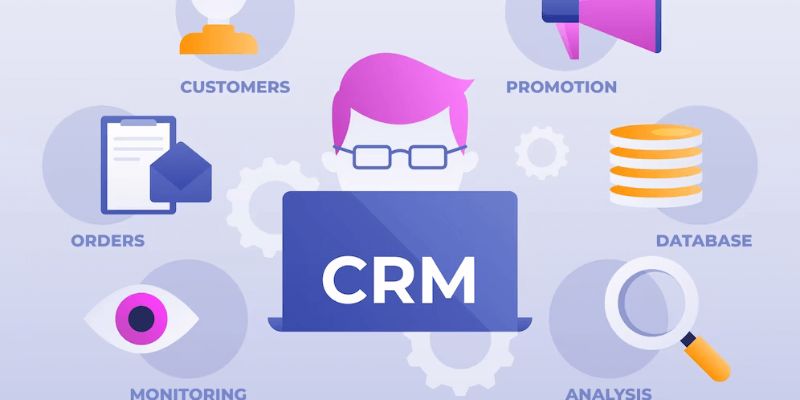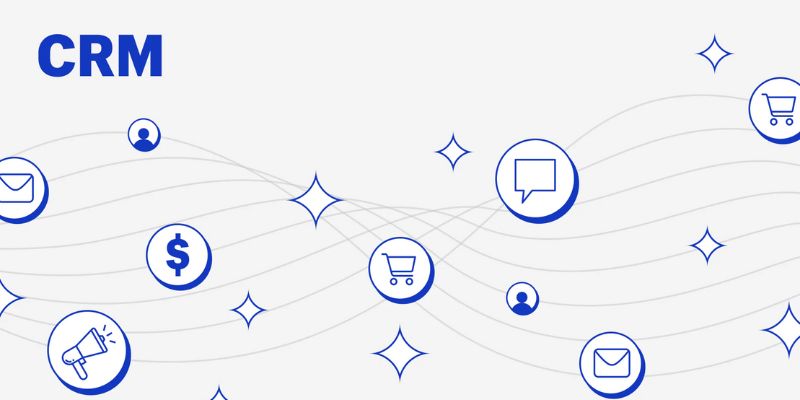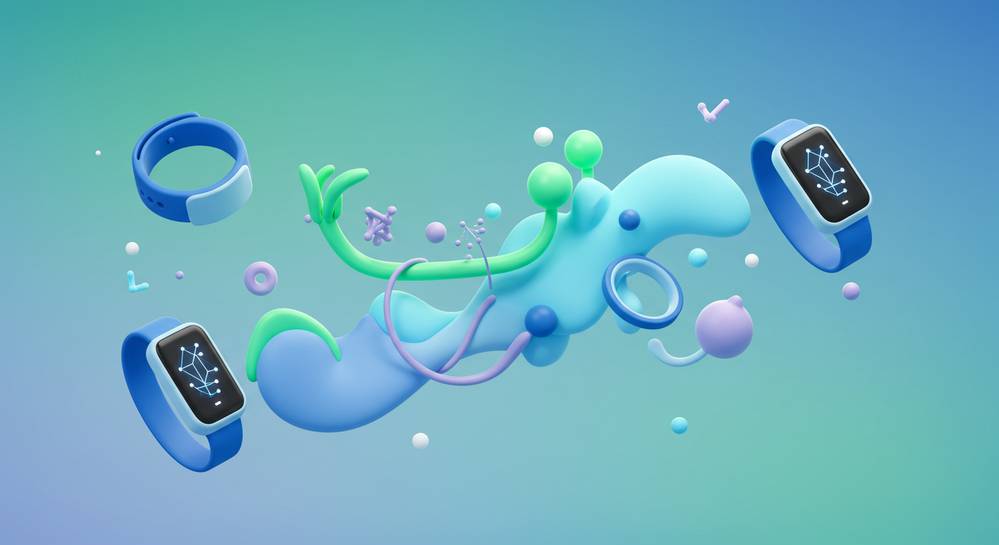Emerging CRM Trends: Revolutionizing Customer Engagement in 2023
This year, it’s all about emerging trends in CRM technology and their impact on customer interactions. As someone deep in the CRM world, I’m seeing big changes. We’re moving towards AI that can predict what customers will do next, allowing us to personalize like never before. It means we’re not just reacting; we’re saying “I know what you need” before the customer even has to ask.
But there’s more. We’re boosting our customer service game with new automation tools and real-time insights. This isn’t just about working faster; it’s about working smarter. And the game changer? Omnichannel CRM. With new tech like voice control and IoT, we can now offer smooth experiences across all platforms. The best part? We’re doing all this while focusing on keeping customer data safe and growing our systems sustainably. Your CRM isn’t just a tool; it’s the frontline of your customer engagement strategy. Let’s dive in and see how these revolutions are unfolding.
AI-Driven CRM Evolution: Transforming Predictive Analytics and Personalization
Harnessing Machine Learning for Precision in Predictive Customer Behavior
AI in CRM systems is like a brain boosting your business. It looks at customer data, finds patterns, and guesses future moves. Machine learning CRM takes this to the next level. It learns more as it goes, getting smarter every day. Picture a shop that knows you like sports. They send you deals on gear before a big game. That’s predictive customer behavior at work.
Machine learning filters through heaps of data. It spots who might leave your brand. It finds chances to sell more. Quick action here means happy customers who stay longer. CRM software upgrades make this smarter over time. They crunch numbers, catch trends, and help teams know what customers might want.
Personalization in CRM is following suit. It gets a boost from AI knowing your customers better than before. Your CRM now can tailor chats, offers, and support like never before. This means customers feel seen, heard, and valued. They get help that fits just right, and that makes them stick around.
Advancing Personalization Tactics Through AI Insights
Personalizing how you talk to customers is key. AI pours over your chats, sales info, and feedback. It gives you a map of what each customer likes or needs. Let’s say you run an online bookstore. AI helps you figure out who likes sci-fi and who’s into cooking. Then it helps you send the right book tips to each reader.
CRM customization options let you change how you interact with every customer. Social CRM functionalities help you talk where your customers hang out. Say they tweet a lot. Your CRM ready with tweets can help them fast. Chatbots in customer support work all day and night. They deal with simple questions, freeing your team for trickier tasks.
CRM data integration is key here. Info flows smoothly between different business parts. Sales, marketing, and support all see the same full picture. Advanced CRM analytics turn heaps of data into clear action points. Tips pop up right when your team needs them.
Customer interaction tools in your CRM can make a big difference. They let your teams reach out the right way at the right time. Be it a quick chat, an email, or a friendly call, your CRM guides them. CRM automation tools can handle tough tasks, quick and with no mess ups.
These trends in CRM tech change how we think about customer ties. They save time, cut stress, and help businesses grow strong. AI and CRM together mean we can give better, more personal service than ever. This isn’t just good for customers; it helps your business bloom too. With smart systems that learn on their own and offer clear data, customer joy and sales soar.

Enhancing Customer Service with CRM Automation and Real-Time Analytics
Maximizing Efficiency with CRM Automation Tools
We know waiting on the phone is no fun. That’s where CRM automation tools step in. These smart systems take care of simple customer issues fast. They make sure people get help without that annoying wait. With automation, repetitive tasks are a thing of the past. This leaves more time for real talk between customers and service teams.
CRM tools now learn from each interaction. They get better and smarter each time they help. This learning is machine learning. It helps predict what a customer will need in future talks. That way, each chat gets more personal and helpful. Happy customers then keep coming back.
Machine learning in CRM is more than a trend. It’s a game-changer. Each time a customer reaches out, this tech makes support quick and right to the point. This brings two big wins: Customers love the fast, smart help, and companies save time and cash. This blend of AI and customer service is shaping how we think about support.
Leveraging Real-Time Customer Insights for Proactive Engagement
Ever had someone offer help before you even asked? Like they read your mind? That’s what real-time customer insights are all about. They let businesses see what you want before you click or call. This means they can reach out first, with the right offer or help, just in time.
Data powers this magic. Every click, view, and buy tells a story. These stories help companies see patterns in what customers like and do. This is customer data analysis at work. It’s all about digging into the data and finding clues on how to serve better.
With this data, businesses can spot a problem early and fix it fast. They jump on issues before customers even know there’s a glitch. This keeps customers happy and loyal. Happy customers talk, and their friends listen. Word of mouth spreads, and before you know it, more people are knocking on the door.
Real-time insights are all about staying ahead. They show companies where to go next to keep customers smiling. Using customer engagement technology wisely can mean better service than ever before. More smiles, less waiting, and businesses stay one step ahead. That’s what today’s CRM is all about.
So, let’s wrap it up: CRM is now about talking less and doing more for the customer. Real-time analytics and smart automation help make this happen, shaping the future of customer interaction. Companies using these tools are already seeing the difference. Customers are happier, and those smiles are turning into real business growth. That’s something to think about next time you get help without waiting on hold!

The Rise of Omnichannel CRM: Creating a Seamless Customer Journey
Integrating Voice Technology and IoT for an Omnichannel Approach
Today’s world needs CRM that keeps up. Times change, and so do customer habits. Customers want to shop and talk with companies in many ways, through the web, on phones, and with smart devices. This is where omnichannel CRM comes in. It weaves all these parts into one smooth path.
What is an omnichannel CRM approach? It’s when customers get a steady, top-notch experience, no matter the device or channel. Say you start buying shoes online but finish in the store. The store knows what you did online. That’s omnichannel CRM.
Smart devices and gadgets help us do this well. Voice tech like Alexa or Siri can send tasks to CRM, like “Order my usual pizza.” Your CRM then knows what to do. IoT, or the Internet of Things, makes it smarter. Your fridge, yes, your fridge, can tell your CRM you’re low on milk. Next thing you know, milk is on the way to your door.
But it’s complex, too. We need to make sure all devices and software can talk well with each other. They need to share info so it’s perfect and makes sense, or else the buyer’s trip hits bumps. That’s where AI in CRM systems shines. It can learn and adapt, making the flow of data smooth.
Customizing User Experiences Across Multiple CRM Platforms
Let’s chat about CRM customization options. Say you run a shop, and you’ve got loyal folks who buy your stuff. A good CRM can show you what they like, their past buys, and maybe what they’ll want next. Machine learning CRM takes past data and sees patterns. Then, it helps you make those smart, personal offers. You reach their heart. That’s the power of predictive customer behavior.
Why does this matter? Well, the more you know someone, the better you can serve them. Every person is different. Some love emails, others prefer a quick text. CRM data integration helps you know who wants what. It makes folks feel special, like you really get them.
Your job is to strike a balance. On the one hand, you’ve got loads of data and tech. On the other, there’s the trust your customer puts in you. They want to know their secrets are safe with you. Privacy in CRM technology is huge. You must treat their data like gold and guard it well.
That’s the rundown on CRM trends this year. It’s all about connecting everything together, making shopping sleek, and treating each buyer like the VIP they are. With clever CRM systems, businesses can wow customers. They keep coming back for more when they feel heard and valued. And in the end, isn’t that what every business wants?

Embracing CRM Scalability and Data Privacy in the Digital Age
Adapting to CRM Data Security Trends While Ensuring Privacy
In the world of CRM, privacy matters a lot. We adapt to security trends to keep data safe. This means protecting customer information from threats. With more hackers trying to steal data, strong security is a must.
We use encryption and secure networks in CRM. This makes sure customer data stays private. With better CRM tools, businesses can trust their info is safe. They can share data without fear. And they feel good that their customer’s details are not at risk.
Scaling CRM Solutions to Meet the Demands of a Growing Business
A growing business means more customers and data. So, CRM systems must grow too. They need to handle more work without crashing. This is all about scaling. Making CRM systems bigger and stronger. It means businesses can serve more customers, better.
With AI in CRM systems, scaling is smart and smooth. Machine learning CRM learns as it grows. This way, it gets better over time. As the business grows, so does the CRM. It becomes a powerful tool for keeping up with more work.
Scalability is not just about size. It’s about being agile and ready. Customer data analysis and real-time insights help here. They make the CRM system ready for anything. They tell businesses what customers may do next. This way, sales teams can work smarter.
CRM automation tools play a big role too. They take over routine tasks. So, teams can focus on what matters. Customers get fast, personal help. Processes move like clockwork. This means happy customers and a thriving business.
Scaling a CRM is like a dance. It must move with the music of business growth. With the right steps, it keeps the business moving forward. It’s a beautiful thing to see. A CRM that grows with a business is a winning CRM.
In summary, we keep data safe as CRM grows. Securing privacy and prepping the CRM for more. This way, businesses thrive, and customers smile.
In this post, we’ve explored the dynamic world of AI-driven CRM. We saw how machine learning sharpens predictions of customer behavior and how AI’s insights can tailor personalization. We looked at CRM automation and real-time analytics, which ramp up customer service efficiency and foster proactive customer engagement.
We also touched on the growth of omnichannel CRM, showing how voice tech and IoT blend to give customers a smooth path across platforms. Finally, we delved into the critical issues of CRM scalability and data privacy, crucial for keeping up with business growth without compromising user trust.
To wrap it up, these CRM advancements mark a turning point in how businesses understand and serve their customers. Driven by AI, today’s CRM tools are smarter, swifter, and more sensitive to the changing tide of customer needs and privacy demands. In this digital era, a solid CRM approach isn’t just nice to have—it’s essential for any business looking to succeed and grow. Embrace these tools, and you’ll not just meet but exceed customer expectations.
Q&A :
What are the latest CRM technology trends that are transforming customer interactions?
The integration of Artificial Intelligence (AI) is at the forefront of CRM developments, providing enhanced personalization and predictive analysis. Automation through AI leads to more efficient customer service processes. Another significant trend is the use of chatbots for 24/7 customer engagement. Additionally, the implementation of cloud-based CRM platforms facilitates real-time data access and collaboration across different departments. Social CRM is also gaining traction, emphasizing customer interactions through social media channels and integrating this data into the CRM system. Lastly, mobile CRM solutions are becoming more prevalent, offering the flexibility to access CRM data on-the-go.
How is the application of AI in CRM systems improving customer experience?
AI in CRM systems is revolutionizing customer experience by offering personalized recommendations and customer insights. It enables businesses to predict customer behavior and identify sales opportunities through data analysis. AI-driven CRM tools can automate routine tasks, allowing customer service teams to focus on more complex issues. This leads to faster response times and improved customer satisfaction. AI technology also helps in sentiment analysis to better gauge customer emotions and tailor interactions accordingly.
Can CRM technology trends impact customer loyalty and retention?
CRM technology trends indeed play a pivotal role in influencing customer loyalty and retention. Personalization, aided by AI and machine learning, allows for a more tailored customer experience. CRM systems that offer seamless multi-channel support ensure that customers feel valued and understood, regardless of their preferred mode of communication. Additionally, advanced analytics provide insights into customer behavior and preferences, which can guide targeted marketing efforts and strengthen customer relationships. Robust CRM technologies help in swiftly resolving customer issues, leading to increased trust and the likelihood of repeat business.
In what ways are mobile CRM technologies enhancing the way sales teams operate?
Mobile CRM technologies are providing sales teams with unprecedented flexibility and access to vital information at all times. They allow sales professionals to update client information, schedule appointments, track sales opportunities, and communicate with other team members while away from the office. This instant access to data and functionality enables sales teams to respond quickly to client inquiries and manage leads more effectively. Additionally, push notifications and reminders on mobile CRM apps can ensure that sales teams follow up promptly and nothing falls through the cracks.
How is social CRM shaping the future of customer interactions?
Social CRM is an extension of traditional CRM that focuses on engaging with customers through social media platforms and integrating this interaction data into the core CRM system. It enables businesses to monitor social conversations around their brand, respond to customer inquiries and concerns in real-time, and aggregate customer feedback from social channels. With social CRM, companies gain deeper insights into customer sentiment, preferences, and social influence. By leveraging these insights, they can craft more impactful marketing campaigns, enhance customer service, and build stronger, more informed relationships with their audience.



